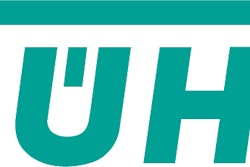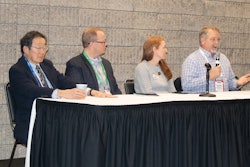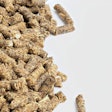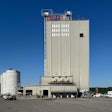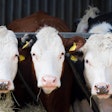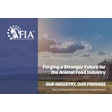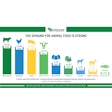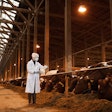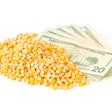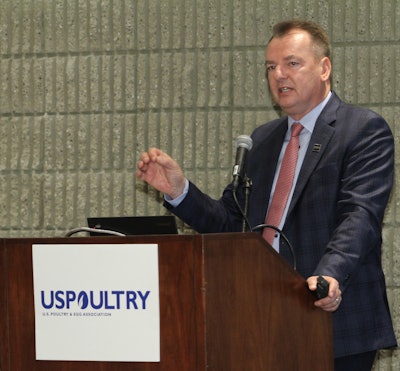
“The efficiency and the way we produce animal protein in the United States is far better than the way many other countries do it. Everything comes down to transparency and the need to prove we are doing the right thing,” said Constance Cullman, president and CEO of the American Feed Industry Association, during the Animal Agriculture Sustainability Summit held at the 2020 International Production & Processing Expo (IPPE). Sponsored by the U.S. Poultry & Egg Association, along with the American Feed Industry Association (AFIA) and the North American Meat Institute (NAMI), the program focused on advancements in industry sustainability programs.
Cullman reviewed AFIA’s Sustainability Initiative and remarked that “AFIA wants to understand the community through surveys, let people have access to reliable feed databases and be able to communicate accurate information.” She also discussed AFIA’s new database launch, GFLI, a global metric for sustainable feed, as well as other AFIA sustainability initiatives.
Eric Mittenthal, vice president of sustainability for the North American Meat Institute, remarked that consumers want to support companies and products that can be solutions to worldwide concerns, such as climate change, animal welfare and human rights. They also want transparency from companies that commit to providing solutions to address their concerns and an honest, open discussion on how to achieve social good.
Mittenthal commented, “The goal of NAMI is to earn trust through a commitment to continuous improvement that demonstrates shared values. This challenge has moved NAMI from being member-focused to member-led and consumer-focused.”
He reviewed NAMI’s outlook, saying, “NAMI is looking ahead to 2030. The organization is taking into consideration that consumers are concerned about animal protein production and consumption and believe the entire animal protein value should be aligned with their values and be an important part of a socially responsible and healthy diet. NAMI looks forward to having the animal protein sector successfully co-exist with those who oppose animal protein today.”
Ryan Bennett, executive director of the Poultry & Egg Sustainability and Welfare Foundation, provided an update on the poultry and egg multi-stakeholder value chain’s welfare and sustainability program development efforts. He was joined by Jack Scott, vice president of sustainability and responsible sourcing for Nestle USA and Nestle Purina Petcare, and a member of the board of directors of the U.S. Roundtable for Sustainable Poultry & Eggs, and Dr. Kate Barger-Weathers, director of world animal welfare for Cobb-Vantress, and chair of the board of directors of the International Poultry Welfare Alliance.
In his presentation on sustainable farming, Frank Mitloehner, Ph.D., professor and cooperative extension air quality specialist at the University of California – Davis, discussed the greenhouse gas effect as related to sustainable farming, food waste, and the International Consumer Attitude Study that sorts consumers into four categories. The food buyer represents 95% of consumers who buy based on taste, cost and nutrition. The lifestyle buyer represents 4% and seeks gourmet, local and organic products. The remaining 1% are known as fringe buyers who promote restrictions and food bans and are vegans who advocate for plant-based alternatives and climate change.
“The vast majority of people like milk, eggs and bacon, and the 99% is not going to listen to the 1%. But we should focus on people that believe in what we do. We are good stewards of the land, of the animals and of people. This is called sustainability,” said Mitloehner. He went on to remark that “we need to communicate the sustainability efforts of the industry to our audiences, and we need to engage in the academic sector to let people know how food is produced.”



